Looking beyond… Then seeing it through…

VOR -2012 - The Big One!
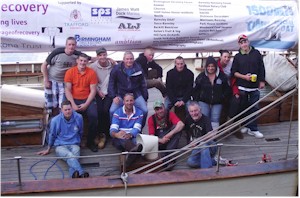 The 2012 Phoenix Futures / Tectona Trust Voyage of Recovery was a 12-week voyage of some 1800 sea miles around Britain. It involved 12 crews from
different Phoenix residential or community units around the UK. The cost of over £70,000 was raised by Phoenix, and there were special promo events
in Glasgow and London - the latter at the prestigious HMS President near Tower Bridge.
The 2012 Phoenix Futures / Tectona Trust Voyage of Recovery was a 12-week voyage of some 1800 sea miles around Britain. It involved 12 crews from
different Phoenix residential or community units around the UK. The cost of over £70,000 was raised by Phoenix, and there were special promo events
in Glasgow and London - the latter at the prestigious HMS President near Tower Bridge.
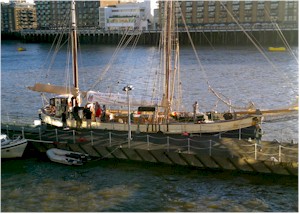 It all started as an idea from Stuart and Darren, soon encouraged by Roger (owner of Tectona). The main hurdle was persuading Phoenix Futures to
go for it, given the cost. But this happened at their Innovator Factor competition in 2011, the wow-factor starting right from the outset with a
sea shanty performed by gravel-voiced Darren. Once the competition was won, the planning began and the complexities of arranging crews, food,
berthing, maintenance can be imagined.
It all started as an idea from Stuart and Darren, soon encouraged by Roger (owner of Tectona). The main hurdle was persuading Phoenix Futures to
go for it, given the cost. But this happened at their Innovator Factor competition in 2011, the wow-factor starting right from the outset with a
sea shanty performed by gravel-voiced Darren. Once the competition was won, the planning began and the complexities of arranging crews, food,
berthing, maintenance can be imagined.
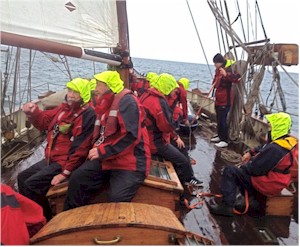 The weather was, if not Mediterranean, at least highly reasonable and very few days were lost to gales or strong contrary winds.
There were a couple of issues with the main engine's fuel system following refuelling in Scotland, though the precise reason was never
identified. The result was a blockage in the fuel line which was thought to be sorted out by the engineer who attended in Peterhead,
but which recurred off Ipswich. These two losses of engine power of course happened at the most difficult time, where there was
either not enough wind for safe manoeuvring or a lee-shore. Both resulted in the lifeboat being called out by the Coastguard to assist Tectona.
These call-outs were not because life and limb were at immediate risk but rather to ensure absolute safety of the vessel and her crew at all times.
We are very grateful to all involved, especially the RNLI, for their assistance. The only other incident of note was breaking the bowsprit in
Liverpool harbour, due to an unavoidable delay in catching the tide. Chris Rees had fashioned a new one, driven it up from Cornwall to Liverpool
and fitted it all within about 36 hours of the event, so the delay was minimal and our schedule unabashed!
We are eternally grateful to Chris once again for his skill and commitment to our work.
The weather was, if not Mediterranean, at least highly reasonable and very few days were lost to gales or strong contrary winds.
There were a couple of issues with the main engine's fuel system following refuelling in Scotland, though the precise reason was never
identified. The result was a blockage in the fuel line which was thought to be sorted out by the engineer who attended in Peterhead,
but which recurred off Ipswich. These two losses of engine power of course happened at the most difficult time, where there was
either not enough wind for safe manoeuvring or a lee-shore. Both resulted in the lifeboat being called out by the Coastguard to assist Tectona.
These call-outs were not because life and limb were at immediate risk but rather to ensure absolute safety of the vessel and her crew at all times.
We are very grateful to all involved, especially the RNLI, for their assistance. The only other incident of note was breaking the bowsprit in
Liverpool harbour, due to an unavoidable delay in catching the tide. Chris Rees had fashioned a new one, driven it up from Cornwall to Liverpool
and fitted it all within about 36 hours of the event, so the delay was minimal and our schedule unabashed!
We are eternally grateful to Chris once again for his skill and commitment to our work.
A report from the Volunteer First Mate, August 31st 2012.
For more latest (plus tracking!): www.phoenix-futures.org.uk
The Voyage Of Recovery - A First Mate's Story, Leg 4.
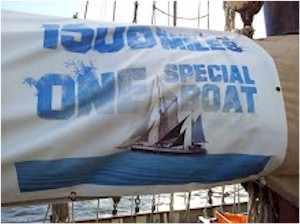 I've just got back from a week on Tectona with
11 people in recent (or fairly recent) rehab from drugs and alcohol. Not only were they delightful company, and not only did we achieve some serious passages,
but the words 'life-changing' keep coming into my head. Even though I've been sailing on and off for over 55 years this trip has affected me in the same way.
I need to try and work out why.
I've just got back from a week on Tectona with
11 people in recent (or fairly recent) rehab from drugs and alcohol. Not only were they delightful company, and not only did we achieve some serious passages,
but the words 'life-changing' keep coming into my head. Even though I've been sailing on and off for over 55 years this trip has affected me in the same way.
I need to try and work out why.
Clearly, this has got to be rooted in both the boat and the people. I've often heard it said that sailing is all about the people and the boat is merely a tool for them to use, but I don't agree. Tectona has a strong personality of her own, which makes a clear impact on those who sail in her. They often say "I love this boat" and they are usually referring to the way she has looked after them, made them feel secure, and how their physical effort has been rewarded by crossing longish distances of potentially threatening sea. The gear is heavy, but not too heavy for you to rapidly get good at handling it in teams of 2 or 3 people, and a well-executed tack or gybe soon becomes a very satisfying achievement. At these times, the boat is dictating what has to be done right now, and personal issues have to take second place or be put on the back burner for a bit. But the voyage is absolutely about those issues, so it is usually not long before there is a lull in activity on deck and people relax and talk.
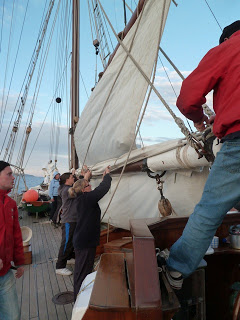 On this most recent leg of the VOR, my job as first mate became much easier and more rewarding once the tasks began to be understood by the guest crew.
This also meant I had to understand them myself first! Particularly the art of sweating and tailing on a rope is key, because the boat will not sail well
(or even completely safely) until this is mastered by most if not all of the people working on deck. I'm naturally fairly quiet and it takes an effort to use a
loud voice to goad people into action; sometimes with such words as swabs or even scurvy dogs (for emphasis, you understand). So when the teamwork was settling down
I became much happier, and I was then able to begin to discover about the delightful individuals we had on board. The humour was simply amazing. One
time we were hoisting headsails. "Right, fore-stays'l!" I shouted. "Bless you!" came the reply from the team. We all fell about and took several minutes
before we had enough breath to even think of pulling on a rope.
On this most recent leg of the VOR, my job as first mate became much easier and more rewarding once the tasks began to be understood by the guest crew.
This also meant I had to understand them myself first! Particularly the art of sweating and tailing on a rope is key, because the boat will not sail well
(or even completely safely) until this is mastered by most if not all of the people working on deck. I'm naturally fairly quiet and it takes an effort to use a
loud voice to goad people into action; sometimes with such words as swabs or even scurvy dogs (for emphasis, you understand). So when the teamwork was settling down
I became much happier, and I was then able to begin to discover about the delightful individuals we had on board. The humour was simply amazing. One
time we were hoisting headsails. "Right, fore-stays'l!" I shouted. "Bless you!" came the reply from the team. We all fell about and took several minutes
before we had enough breath to even think of pulling on a rope.
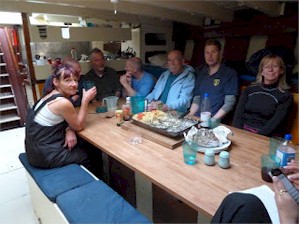 Perhaps unlike other groups of people who go sailing, rehab people have all been through some very tough times, and stories of emotional abuse
in childhood are common. But despite this, the conversations are never self-pitying or mawkish, quite the reverse. There is a feeling of joie de
vivre, an excitement and pleasure in simple things that had been impossible a few months ago. Our conversations very quickly became animated debates
about some serious issues: Russell Brand; the meaning of Abstinence, or Is Everyone Addictable? These really stimulating talks went on sometimes for
hours, often at night under a starlit sky.
Perhaps unlike other groups of people who go sailing, rehab people have all been through some very tough times, and stories of emotional abuse
in childhood are common. But despite this, the conversations are never self-pitying or mawkish, quite the reverse. There is a feeling of joie de
vivre, an excitement and pleasure in simple things that had been impossible a few months ago. Our conversations very quickly became animated debates
about some serious issues: Russell Brand; the meaning of Abstinence, or Is Everyone Addictable? These really stimulating talks went on sometimes for
hours, often at night under a starlit sky.
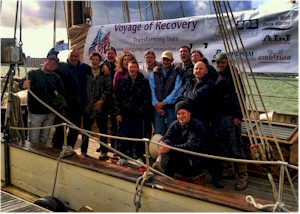 Meanwhile Tectona would be forging through the waves, her steady onward surge giving a feeling of immense power with the balance of a thoroughbred.
Looking aloft the main and topsail would be slowly making an arc against the sky, first one way then the other, blacking out the stars behind.
The sails are inanimate sheets of Terylene stitched together by the consummate art of our traditional sailmaker; a part of what Frank Mulville called the symphony
of spars, shrouds, halyards and sheets that have for centuries made up a traditional sailing boat. I couldn't think of anywhere else I would rather be.
Meanwhile Tectona would be forging through the waves, her steady onward surge giving a feeling of immense power with the balance of a thoroughbred.
Looking aloft the main and topsail would be slowly making an arc against the sky, first one way then the other, blacking out the stars behind.
The sails are inanimate sheets of Terylene stitched together by the consummate art of our traditional sailmaker; a part of what Frank Mulville called the symphony
of spars, shrouds, halyards and sheets that have for centuries made up a traditional sailing boat. I couldn't think of anywhere else I would rather be.
R.C. 31st August 2012.